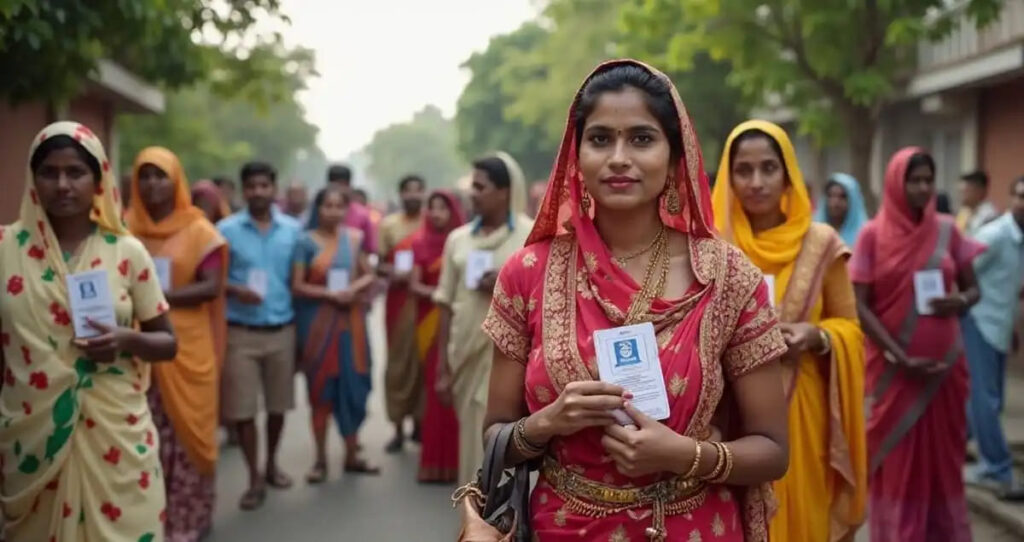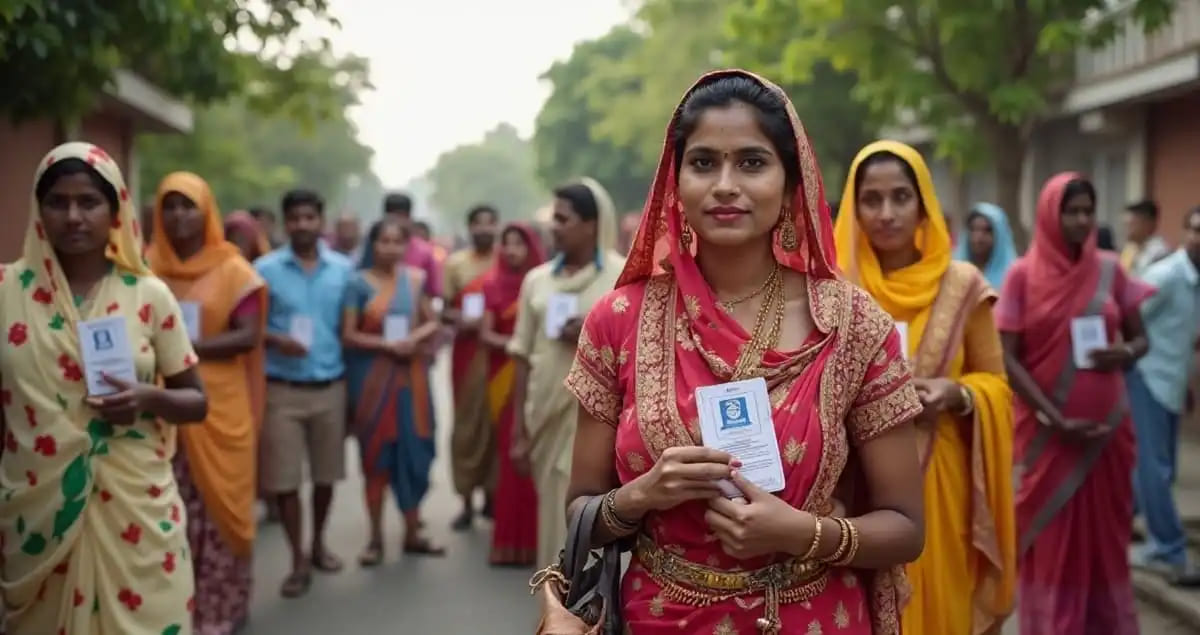
Strategic Analysis of Democratic and Economic Challenges in India
An October 2025 Snapshot
This web of interconnected issues risks creating systemic paralysis, where the state’s capacity to address any single major challenge is crippled by compounding failures in other essential domains.
By Rakesh Raman
New Delhi | October 19, 2025
1.0 The Crisis in Governance and Democratic Institutions
Robust democratic institutions and effective governance are the bedrock of national stability and long-term progress. They provide the framework for fair elections, accountable leadership, and the delivery of essential public services. However, recent events in India raise significant questions about the integrity and efficacy of the nation’s political and administrative systems. This section analyzes key incidents that highlight a growing crisis in electoral processes, high-level political conduct, and municipal administration.
1.1 Electoral Integrity Under Scrutiny
The foundation of any democracy is the trust citizens place in their electoral process. In India, this trust is being severely tested. While the Election Commission of India (ECI) defends its voter list revision process and announces new reforms for the upcoming Bihar Assembly election, scheduled for November 6 and November 11, critics allege these measures are a distraction from deeper issues of potential electoral manipulation.
This climate of distrust is fueled by a volatile cycle of accusations between the country’s main political forces. In Telangana, the Congress party faces accusations of “Vote Chori” (vote theft). Simultaneously, Congress continues to level serious allegations against Prime Minister Modi’s BJP, accusing it of systemic election theft through manipulation of electoral rolls and tampering with Electronic Voting Machines (EVMs). This perpetual state of mutual accusation does more than simply erode public confidence; it creates a crisis of legitimacy for India’s entire democratic framework, making effective governance and policy implementation exponentially more difficult regardless of which party is in power.
1.2 High-Profile Corruption Allegations
The persistence of high-level corruption charges against senior political figures remains a critical challenge to clean governance. A prominent case study is the legal action against former Union Railway Minister Lalu Prasad Yadav, against whom a Delhi court has officially framed charges of corruption, criminal conspiracy, and cheating. The case extends to his wife, former Bihar Chief Minister Rabri Devi, and his son, former Deputy Chief Minister Tejashwi Yadav, illustrating how allegations of corruption can permeate the highest echelons of political families. Such high-profile cases do more than damage public perception; they signal a significant political risk factor, indicating that key nodes of power may be compromised by corruption, with potential impacts on policy stability and the rule of law.
1.3 Municipal Governance Collapse: A Case Study
Failures in governance are not confined to the national political stage; they manifest starkly at the municipal level, directly impacting citizens’ daily lives. A recent report from Delhi provides a visceral example of this breakdown. A “massive, sprawling pile of filth” has completely overtaken a significant stretch of a public road, transforming it into a hazardous dump. This is not merely an issue of poor sanitation but stands as a “testament to the absence of effective administration.” When a capital city’s basic infrastructure fails so visibly, it signals a deeper collapse in the administrative machinery responsible for delivering essential services.
These pervasive failures in the political and administrative spheres put immense pressure on the judiciary, the one institution constitutionally mandated to act as a final check on executive and legislative power. However, as the next section explores, that institution is facing its own crisis of capacity.
2.0 The Eroding Authority of the Judiciary
The judiciary serves as a cornerstone of democracy, tasked with interpreting the law, safeguarding fundamental rights, and holding the executive and legislative branches accountable. Its authority rests on public trust in its integrity, impartiality, and efficiency. However, recent assessments and functional breakdowns suggest a systemic decline within this vital institution, threatening its capacity to fulfill its constitutional obligations.
2.1 Systemic Decline and Inefficiency
The India Judicial Research Report 2025 presents a sobering diagnosis of the country’s legal system, unveiling “alarming findings” that point to widespread and deep-seated problems. It identifies three core areas of decay: corruption, inefficiency, and moral decline. These are not isolated issues but symptoms of a systemic malaise affecting the judicial system across the board. Such a fundamental decline compromises the judiciary’s ability to deliver timely justice and act as an effective bulwark against executive overreach and administrative apathy.
2.2 Technological Breakdown and Procedural Opacity
The judiciary’s struggle with basic modernization further exemplifies its inefficiency. The implementation of the Delhi High Court’s E-Filing Portal, a critical tool for improving access to justice, has been a notable failure. The system has been “marred by frequent crashes, procedural opacity, and inaccessible interfaces.” This technological breakdown is more than a simple inconvenience; it is a concrete manifestation of the systemic inefficiency highlighted in the broader judicial report, creating significant barriers for legal professionals and citizens attempting to navigate the justice system.
A judiciary weakened by internal decay and operational failure creates a vacuum of accountability, a condition that emboldens malfeasance not only in government but also within the powerful corporate sector, where issues of transparency and governance are becoming increasingly acute.
3.0 Corporate Accountability and Systemic Economic Failures
A nation’s economic health and its attractiveness as an investment destination depend heavily on strong corporate governance, reliable infrastructure, and a high degree of consumer trust. Recent cases in India, however, highlight significant deficiencies in corporate accountability and systemic failures in service delivery, which stand in contrast to major developments in the global technology economy.
3.1 Global Scrutiny and Enforcement Challenges
The challenges of enforcing international corporate accountability are starkly illustrated by the case involving the Adani Group. The U.S. Securities and Exchange Commission (SEC) is reportedly struggling to serve summons to the group’s executives in relation to allegations of securities fraud and bribery. This difficulty in executing a basic legal procedure against a major Indian conglomerate on the global stage underscores the complexities and potential obstacles in holding powerful corporations accountable to international legal and regulatory standards.
3.2 Erosion of Consumer Trust and Corporate Transparency
Domestically, a lack of transparency and repeated service failures are eroding consumer trust in major corporations. Two recent examples highlight this trend:
The Bisleri Case: The bottled water giant Bisleri “continues to evade public accountability” by persistently refusing to disclose the methods it employs to verify and ensure the purity of its water. This lack of transparency on a fundamental public health issue undermines consumer confidence.
The Airtel Case: Recurring broadband outages experienced by Airtel customers in New Delhi are not “isolated technical glitches but symptoms of a deep-rooted systemic problem.” This indicates a critical infrastructural deficit and operational risk within a key sector, undermining the digital backbone required for a modern economy.
3.3 The AI Boom: A Contrasting Economic Narrative
While India grapples with these domestic systemic failures, the global technology landscape is undergoing a dramatic transformation. OpenAI, the creator of ChatGPT, has seen its valuation soar to an astonishing $500 billion following a secondary share sale of $6.6 billion. As commentator Imrana explains, it is crucial to understand that such a valuation is more about “belief than balance sheets.” It represents the market’s profound confidence in the company’s future potential, not the cash it currently possesses. This highlights a global economic narrative driven by forward-looking technological potential, which contrasts sharply with the on-the-ground reality of infrastructural and corporate challenges in India.
The ability to address these corporate and infrastructural challenges and participate more fully in future economic trends depends on a nation’s foundational asset: its human capital, which is directly shaped by the national education system.
4.0 The Education-Employability Disconnect
The quality of a country’s education system is directly linked to its long-term economic trajectory, innovation capacity, and global competitiveness. A system that effectively prepares its youth for the demands of the modern economy is essential for national development. However, a critical new report suggests that India’s school system is fundamentally failing in this primary objective.
4.1 The Core Crisis: A System Failing to Make Students Employable
The report, titled ”Job with Education: School Education Report 2025 to Make Students Employable”, delivers a stark verdict on the state of Indian schooling. Its central argument is that there is an “undeniable line from the failing education system to its severe negative outcomes.” These consequences impact both individual students and the nation’s overall economic health. The report identifies a fundamental failure in human capital development, a core lagging indicator that threatens India’s future economic competitiveness and its ability to innovate.
4.2 A Call for Systemic Reform
This assessment is echoed by sharp commentary on the need for a paradigm shift in educational philosophy. Imrana argues that it is past time “to stop teaching yesterday’s lessons for tomorrow’s jobs.” The core mission of schools, according to this view, must be fundamentally reoriented to prepare students “to live, work, and succeed in the world” as it exists today and as it will exist in the future. This requires a systemic overhaul of what is taught and how it is taught.
The crisis in education forms the final piece of a complex puzzle, setting the stage for a broader understanding of the interconnected challenges facing the nation.
5.0 An Interconnected Web of Strategic Challenges
This analysis reveals a landscape of significant and deeply rooted challenges across India’s most critical sectors. The integrity of the democratic process is threatened by a crisis of legitimacy. Governance is faltering, evidenced by high-profile corruption cases and the visible collapse of municipal services. The judiciary, the institution meant to act as a check on such failures, is itself compromised by systemic inefficiency and decline. Simultaneously, the corporate and economic spheres are marked by issues of accountability and failing infrastructure, while the education system is failing to produce a workforce capable of meeting modern demands.
Crucially, these are not isolated problems but an interconnected web of mutually reinforcing challenges. A weakened judiciary is ill-equipped to hold powerful political actors accountable or to enforce transparency on major corporations. Systemic failures in governance lead directly to the degradation of public infrastructure, which in turn stifles economic activity. At the base of it all, an outdated education system fails to cultivate the human capital required to address this complex matrix of issues. This web of interconnected issues risks creating systemic paralysis, where the state’s capacity to address any single major challenge is crippled by compounding failures in other essential domains.
By Rakesh Raman, who is a national award-winning journalist and social activist. He is the founder of a humanitarian organization RMN Foundation which is working in diverse areas to help the disadvantaged and distressed people in the society.
Rakesh Raman | LinkedIn | Facebook | Twitter (X)

